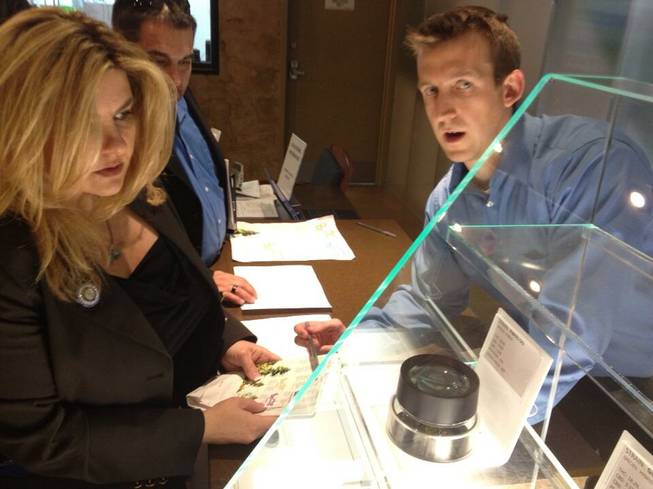
Nevada Assemblywoman Michele Fiore inspects the product and learns about the different uses for and varieties of marijuana during a trip to a dispensary in Arizona on Friday, March 22, 2013.
Friday, May 17, 2013 | 2 a.m.
Advocates for medical marijuana argued Nevada could bring in $10 million to $30 million a year for state coffers if lawmakers approve a bill to create a dispensary system.
The bill to establish a regulated and taxed dispensary system is winding its way through the Legislature, and the economic benefit studies are its supporters’ latest pitch to win approval from lawmakers who are looking for new revenue to support education programs.
“This potentially could be a huge money maker for the state,” said Sen. Tick Segerblom, D-Las Vegas, the sponsor of Senate Bill 374.
Various lobbyists supporting the measure noted that the state could bring in millions of dollars from a series of fees baked into the bill that dispensaries would be responsible for, as well as transaction fees that patients would pay every time they buy marijuana.
The bill has bipartisan support in the Senate.
Sen. Mark Hutchison, R-Las Vegas, said it may seem unusual for a conservative lawyer who’s never tried marijuana to partner with a self-described liberal Democrat on a bill to ease access to medical marijuana.
But it’s a constitutional, state’s rights issue for Hutchison.
The state constitution directs the Legislature to make marijuana available to medical patients in Nevada.
“You don’t get to pick and choose which parts of the constitution you adhere to,” he said, noting that voters had approved in 1998 and again in 2000 a ballot question amending the constitution to allow for medical marijuana. “That’s the end of the story.”
Segerblom and Hutchison contend that the state’s current medical marijuana laws essentially make patients into farmers because they have to grow their own crop. A loophole in the law makes it legal to grow the leaves but not to purchase the seeds.
A judge in Clark County ruled that the law does not provide any meaningful way for legal patients to exercise their constitutional right.
The two legislators and several of their colleagues in the Senate took a trip to Arizona earlier this year on a fact-finding mission to see how Nevada’s neighbor was setting up its own dispensary system.
Many of the Arizona law’s provisions are in the Nevada bill too.
Legislators in Nevada have focused their efforts on crafting a safe, secure and well-regulated system, stressing that the bill would not allow just anyone to obtain a card or run a dispensary.
“We don’t want this to look like some Jerry Garcia smoking lounge,” Hutchison said. “We want this to be a serious effort to dispense medicine.”
Therefore the bill sets business license fees at $20,000 to open a dispensary and $5,000 to renew a license. The bill also requires proof of $150,000 of liquid assets from each prospective dispensary owner, a nod to the fact marijuana is still illegal under federal law. Banks generally won’t lend capital to dispensaries for that reason.
“All of these business people know very well that this is a federal offense,” Hutchison said. “At any time the federal government can come in and shut you down and there’s nothing the state of Nevada can do about it.”
The dispensaries under the bill would be for-profit businesses, which Hutchison said allows law enforcement to better monitor their activities.
Hutchison also said an amendment will be added to eliminate the current homegrow method of obtaining marijuana, another change law enforcement officials supported.
“From seed to sell, you’ve got to be able to track that,” he said.
One man in opposition to the bill disliked this change, noting that he would have to pay more money to buy a product that he now grows as a medical marijuana patient.
“Everybody is coming out ahead on this except for the patient,” said Daniel Johnston of Pahrump. “The patient is no longer allowed to grow on his own.”
While Hutchison crowed various times that law enforcement had helped craft the bill, the Attorney General’s Substance Abuse Working Group submitted a letter to legislators Thursday opposing the measure.
The letter listed complaints asserting that marijuana is unsafe and contributed to violence and drug addiction.
“We would appreciate your assistance in not supporting this legislation so that we may all enjoy a safer and better Nevada,” wrote David Marlon, chairman of the Substance Abuse Working Group legislative sub-committee.
Attorney General Catherine Cortez Masto and several law enforcement officials are listed as members of the group.
At least one of the letter’s assertions appears to be false, however. The letter states that most of the state’s medical marijuana cards were given to people under the age of 40.
The state currently has 3,785 medical marijuana patients, the majority of whom qualify for the state-run program because of severe pain complaints and are over the age of 40.
The bill still requires a vote from the full Senate and Assembly as well as Gov. Brian Sandoval’s signature before it becomes law.
Hutchison and Segerblom, however, need to act quickly because the legislative session ends June 3.

Join the Discussion:
Check this out for a full explanation of our conversion to the LiveFyre commenting system and instructions on how to sign up for an account.
Full comments policy